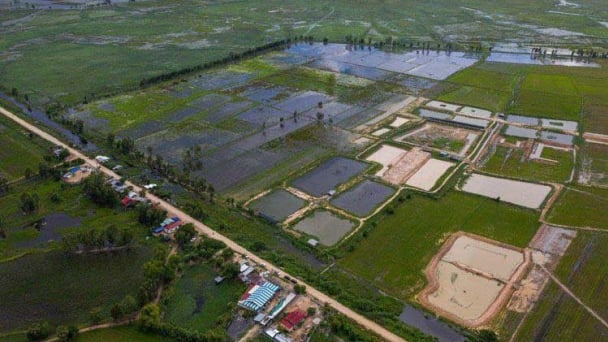May 17, 2025 | 10:42 GMT +7
May 17, 2025 | 10:42 GMT +7
Hotline: 0913.378.918
May 17, 2025 | 10:42 GMT +7
Hotline: 0913.378.918

Mr. Lim Dyi Chang, Director of the Corporate Banking Division at UOB Vietnam (on the left), and Mr. Doan Toi, CEO of NAVICO (on the right), during the signing ceremony in Ho Chi Minh City.
This is a green credit agreement (commercial credit) signed between UOB Vietnam and Nam Viet Joint Stock Company (NAVICO), aimed at fostering the development of sustainable aquaculture that aligns with international standards.
According to UOB Vietnam's analysis, the seafood industry is one of the major pillars of Vietnam's economy, contributing approximately 16% to the total agricultural export turnover, with annual export values ranging from 9 to 11 billion USD. Vietnam currently ranks as the third-largest seafood exporter in the world, following China and Norway. However, despite its economic importance, the industry has a significant environmental impact.
As the global demand shifts toward more sustainable, eco-friendly aquaculture practices, Vietnamese businesses face increasing pressure to adapt quickly. They must transform their production models to maintain their competitive advantage, comply with international technological standards, minimize environmental impact, and protect marine ecosystems.
To achieve this green credit agreement, NAVICO underwent a rigorous sustainable finance approval process by UOB. This green commercial credit will support NAVICO’s sustainable aquaculture operations, from purchasing raw materials that meet international standards to deeper investments in advanced production technologies. It will also optimize supply chains in a modern, scientific, and efficient manner while embracing new initiatives in line with global green trends, such as circular economy practices, resource conservation, and clean energy transition.
Prior to this, UOB Vietnam had also extended financing to NAVICO for the installation of rooftop solar power systems at its aquaculture facilities. This project is significant not only in helping the company reduce its operational costs amidst rising electricity prices but also in aligning with the company’s long-term sustainability goals. By investing in solar power, NAVICO is making strides toward reducing its carbon footprint and contributing to the broader goal of achieving net-zero emissions by 2050.
As of April 2025, UOB Vietnam has financed 19 green credit projects across various sectors, including renewable energy, sustainable agriculture, manufacturing, and aquaculture.
Looking ahead to 2025, UOB Vietnam plans to focus its green financing efforts on supporting small- and medium-sized enterprises (SMEs), especially domestic businesses that are eager to transition to more sustainable practices. The bank aims for at least 30% of new credit facilities granted to this segment to be dedicated to funding initiatives related to sustainable development.
As of December 2024, UOB’s sustainable finance portfolio across the region has seen impressive growth, increasing by 43% and reaching a total value of 58 billion Singapore dollars. This figure far surpasses the initial target of 30 billion Singapore dollars that the bank set for 2025.
Translated by Phuong Linh
/2025/05/16/3800-0-nongnghiep-143756.jpg)
(VAN) Suntory PepsiCo Vietnam coordinated with the Ministry of Education and Training to implement an education program on water conservation, reaching nearly 1 million primary school students nationwide.

(VAN) Vietnam’s TH Group officially put its high-tech fresh milk processing plant into operation in the Russian Federation, marking a historic moment as the first TH true MILK cartons were produced in Russia.

(VAN) Use of high-quality broodstock and biotechnology is regarded as the most effective approach to ensuring sustainable and economically viable shrimp aquaculture ahead of climate change and the emergence of increasingly intricate disease patterns.

(VAN) Carbon farming is a form of agricultural practices that helps absorb more greenhouse gases than it emits, through smart management of soil, crops, and livestock.

(VAN) This is a key content of the Memorandum of Understanding recently signed between the Vietnam Fisheries Society and Kunihiro Inc of Japan.

(VAN) To achieve the goal, local authorities and businesses in Kon Tum province have fully prepared the necessary conditions for the new Ngoc Linh ginseng planting season.

(VAN) Jiangsu province is gearing up to host training programs in Phnom Penh, the capital of Cambodia, this year to establish the Fish and Rice Corridor.